by Niki Crawson | Apr 6, 2023
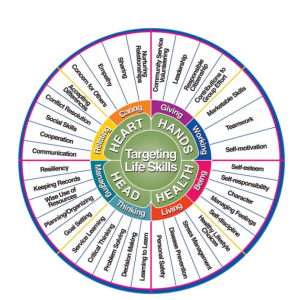
Figure 1. Hendricks, P. (1998) “Developing Youth Curriculum Using the Targeting Life Skills Model”
During the summertime, 4-H typically offers more opportunities for our teen audience since school is not in session as their schedules are more flexible. Because of this, we want to ensure that we are targeting skills that are specific to our teens’ immediate and future wellbeing and success.
In this article, I will discuss why life skills are so important, what 4-H programs already established target, which life skills are most beneficial for our teens and what, when, and how teens can get involved.
WHY DO WE CARE SO MUCH ABOUT LIFE SKILLS?
We know that life skills are abilities learned that help individuals reach their full potential in life. They assist in helping folks successfully handle day-to-day life experiences. We believe they are developed through hands-on learning, activities, and practice.
Life skills are the foundation of 4-H. Utilizing the Targeting Life Skills Wheel (Hendricks, 1998), we connect life skills through 4-H projects, programs, and events to real life experiences based on our Head, Heart, Hands and Health model. By helping youth achieve these life skills, 4-H professionals and volunteers are providing the framework for future academic and employment success, as well as youth thriving and community outreach.
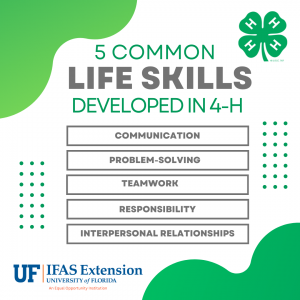
Five essential life skills from the Targeting Life Skills Model commonly developed by participating in 4-H are:
- Communication
- Problem-solving
- Teamwork
- Responsibility
- Interpersonal Relationships
PROJECTS & EVENTS RELATED TO LIFE SKILLS FOR TEENS
Below are just a few 4-H projects and events in Florida 4-H for teens to get involved in to develop and strengthen essential life skills:
- 4-H Tailgating Contest – This program teaches healthy living and the science of grilling seafood, pork, poultry and beef safely outdoors. This program teaches decision making, healthy lifestyle choices, and communication life skills, among others.
- Gator Pit – The Gator Pit is a program open to all teens ages 14-18 in Florida. Youth are taught how to develop entrepreneurial skills through mentorship, competition, and networking to the business community.
- 4-H Legislative – Florida 4-H Legislature provides an opportunity for teens ages 14-18 to experience state government procedures and prepare them for potential leadership in the American democratic process. Youth learn, practice, and defend public policy.
- 4-H University – Florida 4-H University is an opportunity for teens to participate in educational workshops lead by UF faculty, explore potential careers, strengthen interpersonal relationships with peers, and develop critical life skills that will help them become leaders and engaged citizens in their communities.
The Florida 4-H Curriculum Clearinghouse is a list of 4-H resources available, including project curriculum, record books, club resources and other educational publications that meet the standards of Florida 4-H. In this site you can view resources for specific projects. To learn more about 4-H opportunities for teens, please contact your local UF IFAS County Extension Office, or visit http://florida4h.org.
ADDITIONAL SOURCES:
Hendricks, P.A. (1998). Developing Youth Curriculum Using the Targeting Life Skills Model: Incorporating Developmentally Appropriate Learning Opportunities to Assess Impact of Life Skill Development. Iowa State Extension Publication. https://extension.purdue.edu/4-H/about/impact-targeting-life-skills.
Irvine, K. (2019). What are Life Skills? https://blogs.ifas.ufl.edu/nassauco/2019/02/04/what-are-life-skills/
by Claire Davis | May 6, 2022
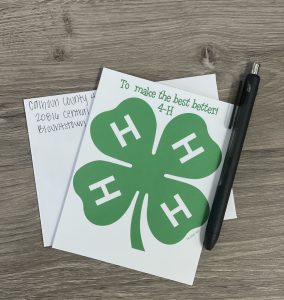 How do you know when it is appropriate to send a thank you card? Have you ever received a gift from someone? Did a volunteer donate their time for an event or for a club meeting? Are you in 4-H and someone purchased your project animal at auction? If you answered yes to any of these questions, then you should have written a thank you note to them! It does not just have to be a life changing event, such as a wedding, birthday, or baby shower, that warrants a thank you card. Whenever someone has done something nice for you, it is definitely worth sending them a thank you card.
How do you know when it is appropriate to send a thank you card? Have you ever received a gift from someone? Did a volunteer donate their time for an event or for a club meeting? Are you in 4-H and someone purchased your project animal at auction? If you answered yes to any of these questions, then you should have written a thank you note to them! It does not just have to be a life changing event, such as a wedding, birthday, or baby shower, that warrants a thank you card. Whenever someone has done something nice for you, it is definitely worth sending them a thank you card.
Writing thank you notes is a skill that many people should have, but many overlook. What exactly do you need to say in your thank you note? Here is an easy guide for a few things that you should include in your thank you note, regardless of the reason you are writing it!
Make sure that you start off by thinking of why you are writing a thank you note! Thank you notes let the individuals know that you care, that you are proud of your accomplishments, or make them feel appreciated for something that they have done for you!
-

A decorated academic cap at commencement. Photo taken 04-29-17.
Make the letter personal by starting with a salutation. Address the individual(s) by their name. If it is someone that you are well acquainted with, it is alright for you to address them by their first name. If it is someone that you are not as familiar with, stick to Mr., Mrs., Ms, and/or Miss last name. Below are a few examples of how to address someone:
Dear Aunt Renae,
Dear Lilly,
Dear Mr. and Mrs. Leonard,
- Get right to the point and express your gratitude. Some examples could be:
“Thank you so much for your generous wedding gift.”
“Thank you for the birthday present.”
“Thank you for donating your time at the Horse Club Meeting.”
“Thank you for purchasing my steer at the Calhoun County Livestock Show.”
- Maybe mention a specific detail or two. There is no need to exaggerate about their gift, but tell them what it might be used for or what you appreciate about it. Here are a few examples of things to say.
“I am so excited to get to use the birthday money on my upcoming trip to Disney World.”
“I’ve had my eye on a smoothie maker, and now I am a smoothie making machine!”
“We are saving the wedding money to help build our future home together.”
“The knowledge you shared at the meeting is incredibly valuable and the kids were soaking it up!”
“I am going to save the money from my 4-H steer project in my college fund.”
- Look ahead to the future. You may be excited about your trip to Disney World or the new smoothie machine, but make sure they know that you appreciate them or enjoyed working with them. If you are likely to spend time with them again in the future, this is a good way to move your letter towards wrapping up.***This suggestion may not apply to every letter.
“I can’t wait to have dinner with you again.”
“I’ll be up that way here in a few months and would love to see you.”
“I am interested in the position and look forward to hearing from you soon.”
“We cannot wait to have you teach us again at the club meeting next month.”
- Wrap it up with another thank you and sign off. Make sure that your letter is clear, you want to thank them for their time, donation, money, etc. You do not have to use fancy language to end your letter.
“Thank you again for thinking of us on our special day!”
“Thank you for being so generous to our organization.”
“Again, thank you for spending your time with us.”

Albert the Alligator Florida Gator mascot holding a thank you sign. Photo taken 11-16-16.
Make sure to end your letter appropriately, whether that be professionally or casually.
“Warmly,”
“With love,”
“Sincerely,”
When in doubt, write a thank you card. Your recipient will feel extra special that you want to show them your gratitude!
by Melanie Taylor | May 1, 2019

Making friends at 4-H Camp in the early 1990’s (Melanie Taylor, Gulf County 4-H Agent, on right)
4-H Summer Camp preparations are in full swing all over the state. As a 4-H agent preparing for our week of county 4-H camp, my days are busy with phone calls and emails from parents, teen counselor training, adult volunteer screenings, paperwork, paperwork and more paperwork. Although it’s busy time for me as a 4-H agent, it also allows me to reflect why I chose this career path and why there is a sense of nostalgia as I prepare for 4-H camp.
Camp Memories
I grew up in Virginia and attended 4-H camp every year from age 9-18. I was a camper that grew into a counselor-in-training and then a full-fledged counselor. Those weeks of 4-H camp were filled with hot days and warm nights, but it was worth it all for the memories I’ll have for a lifetime. I can still smell the cafeteria food and hear the sounds in the gymnasium as kids played basketball and pounded at their leather-craft projects. I still get the chills when I think about our entire camp singing around the campfire circle and patiently waiting for a canoe, filled with camp staff, to land on the lakes edge. The staff would enter the campfire circle carrying the flame and ceremoniously light the fire. I’m still connected with my 4-H camp friends through social media and/or as close friends, and we continue to share our old, blurry camp pictures from the 1990’s each year on Facebook.

Memories to Last a Lifetime…
This is why I work hard to prepare camp for my county campers and teen counselors – I want to create similar memories for them. In 10, 20 or 30 years from now, I want them to think back on the fun moments they experienced in the Florida 4-H camping program. I want them to form friendships and make camp connections for a lifetime, whether it’s learning to kayak, fish, making arts and crafts, cooking over a campfire, singing camp songs and much more.
With all of this said, I hope you as parents will consider giving your child(ren) these special moments. The days are long, but fun, and nights are filled with campfires and hanging out with friends. When they arrive home on Friday, they’ll be exhausted but so excited to share all of the camp songs with you (prepare yourself for lots of loud, enthusiastic singing). They’ll have new friends they want you to meet and tell you camp stories they’ll always cherish.
When is Your County Camping?
In northwest Florida, there are two 4-H Camps:
4-H Camp Timpoochee in Niceville and 4-H Camp Cherry Lake in Madison.
Each county in these camping districts has one week of camp each summer. 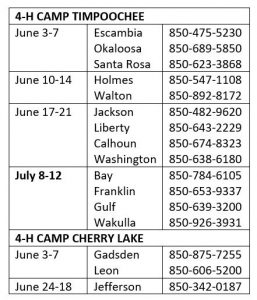 Contact your local UF/IFAS Extension Office now
Contact your local UF/IFAS Extension Office now
to find out the details and register your child for a week of fun and memories!
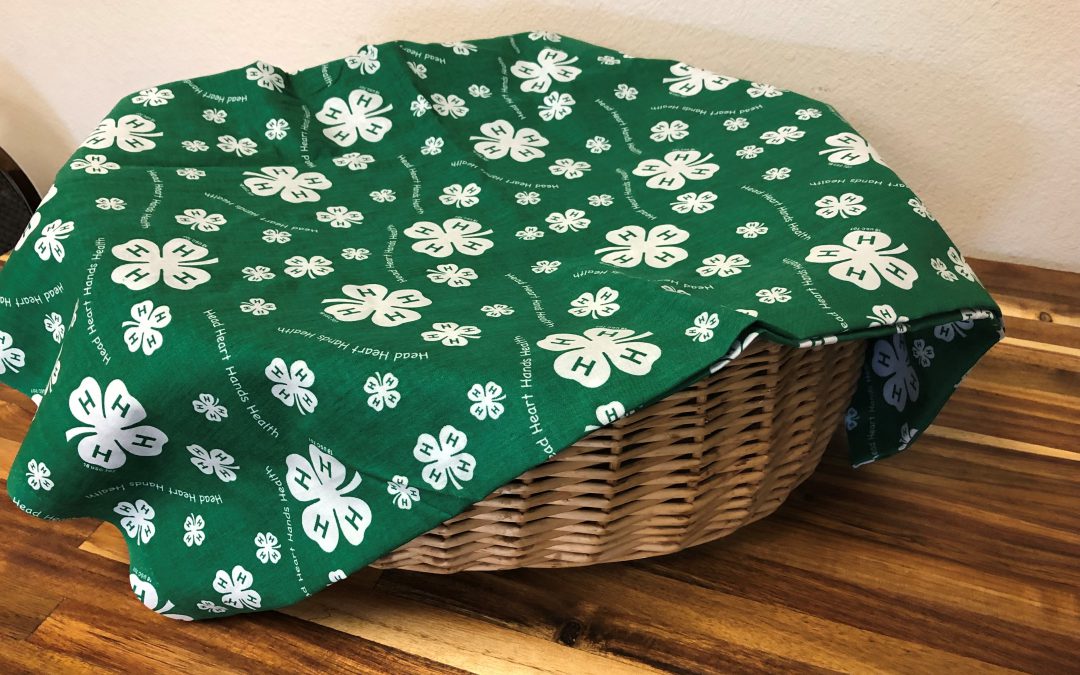
by Marie Arick | Mar 11, 2019

4-H Food Challenge Mystery Basket
Being creative in the kitchen…using a surprise set of ingredients…making a tasty dish…frequent watcher of The Food Network? Then the 4-H Food Challenge camp is the summer day camp for you!
Take a Sneak Peek
Here’s a sample list of possible ingredients in the Fruit & Vegetable category:
- 4 medium potatoes
- 1 cup carrots, sliced
- 1 cup of celery, sliced
- 1 ½ cups green bell pepper strips
- 1/3 cup onions, sliced
- 1 clove garlic, minced
- 1 tomato, cut into wedges
- 3 tablespoons of canola oil, divided
- ½ cup of water
- 2 tablespoons of low sodium soy sauce
- 1 ½ teaspoons of cornstarch
Any idea what you’d prepare? What would you name your dish?
Participants in the 4-H Food Challenge camp will work in teams with 3 to 4 members. Teams will be presented with:
- a food category
- a set of mystery ingredients
- 40 minutes to create a dish, prepare a presentation about their dish, and clean their work area
When time is up, teams will present their creation to a panel of judges describing their collaboration in creating the dish, food safety practices used by the team, how they worked together, and finally, a description of the dish including some nutrition information.
We all eat, so food safety and preparation are skills that we all need. 4-H Food Challenge campers will learn those skills along with nutrition knowledge, teamwork and presentation skills. Look for this day camp opportunity in your local UF/IFAS Extension 4-H program this summer, and join us in putting our skills to the test!
*The 4-H Food Challenge is loosely based on The Food Network show “Chopped” and adapted from the Texas 4-H Food Challenge Contest.
by Melanie Taylor | Dec 14, 2018

Aim to find JOY in this holiday season.
As the holiday season quickly approaches, many people are filled with extra holiday cheer and enthusiasm. Some are jolly but still overwhelmed with all of the activities, decorating, and shopping that needs to be completed. Then, there are those that find the holiday season as a reminder of things such as the death of a loved one, family feuds, divorce…the list goes on. If you are feeling this way, here are a few tips to make getting through the season a little bit easier.
- Feel your emotions – Many people want to suppress their sadness or anxiety, but this only makes it worse. We are all allowed to grieve, cry and feel mad at times. If you feel this way, let yourself feel your feelings. You will feel better once you have accepted and worked through the emotions. You also do not have to force yourself to feel happy just because it is the holiday season.
- Reach out to others – Instead of secluding yourself, spend time with others whether it’s at church, a community group or with family and friends. Spending time with others and socializing is good for the spirit.
- Volunteer – There are tons of volunteer opportunities during the holidays. Try something new and volunteer your time to a worthy cause. You’ll feel great about helping others and contributing to a cause.A national survey commissioned by UnitedHealth Group talked to 3,351 adults and found the majority of participants reported feeling mentally and physically healthier after a volunteer experience.
The research showed:
* 96% reported volunteering enriched their sense of purpose in life
* 94% of people said volunteering improved their mood
* 80% of them feel like they have control over their health
* 78% of them said volunteering lowered their stress levels
* 76% of people said volunteering has made them feel healthier
* About a quarter reported their volunteer work helped them manage a chronic illness by keeping them
active and taking their minds off of their own problems
* Volunteering improved their mood and self-esteem
- Be realistic – Realize that times and traditions change as families grow and age. Do not focus on things having to be the same every year. Be willing to accept changes, such as adult children may not be able to attend the family gathering, so utilize technology and talk through video conferencing, share pictures on email and/or Facebook. Find a way to make it work.
- Set aside differences for everyone’s sake. Aim to accept family and friends the way they are, even if they do not meet your expectations. Leave grievances at the door for the day and enjoy your family and friends. Share those grievances and talk at a more appropriate and private time. Also, remember they could be feeling the stress of the holiday too. So, be patient if someone is grouchy or sad as you celebrate. You may both be feeling the same way.
- Learn to say no – Be realistic in the number of activities you and your family can participate. Do not feel guilty because you cannot attend every party and event you are invited too. Graciously decline an invite and share that your schedule is booked, but thank them for thinking of you. A host does not expect that everyone will attend their parties.
- Take a breather as needed – If you start to feel overwhelmed with anxiety, anger or sadness take a few minutes to be alone. Take 15 minutes to spend in the quiet to reduce the stress and clear your mind. For example: listen to soothing music, do a few mindful breathing exercises to slow yourself down or read a book to temporarily escape the stress.
- Seek professional help as needed – there are times when the emotions are just too overwhelming to sort through on our own. If you continue to feel sad, anxious, angry, etc. there is absolutely no shame in seeking the help of a doctor or mental health professional. It will only help you work through your feelings with a non-bias person. Helping yourself feel better will improve your quality of life and those around you.
Learn to take care of yourself first. Learn your limitations and accept them. Don’t t let other’s expectations overwhelm you. Just remember when you start feeling extreme levels of emotions and/or stress, take a few deep breathes and remind yourself to relax and feel the moment. Be mindful of your surroundings and remind yourself of your many blessings even when going through difficult times. Make it your personal goal to feel your feelings and enjoy what you can about the holiday season whether it is the twinkling lights, time with friends and family, the food or any of the many special holiday traditions.
Striving for and maintaining a healthy lifestyle is an achievable goal and a National 4-H Council mission mandate for all of our 4-H members, families and volunteers. To learn more about healthy lifestyles and 4-H, find your local UF/IFAS Extension office.
Sources:











